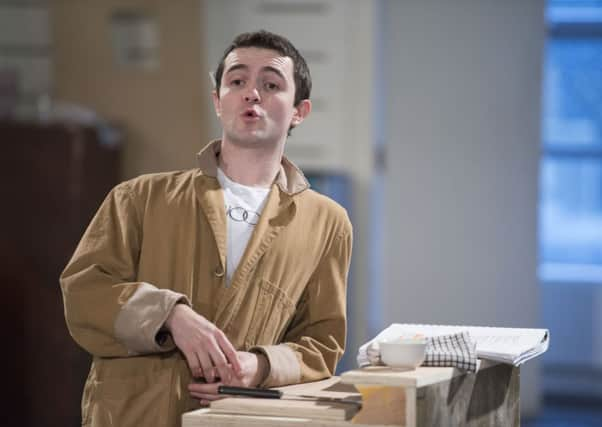Joyce McMillan: New plays to tackle sectarianism


There’s neon in the foyer, a rock’n’roll band in full swing, and theatre staff dressed to the nines in draped teddy-boy suits and swirly polka-dot skirts; its 1950s night at the Citizens’, as the theatre launches its new production of John Byrne’s The Slab Boys, and the mood is both riotous and super-cool.
Among all the many strands of cultural reference in Byrne’s 1978 masterpiece, though, there’s one that is rarely teased out for comment; and that’s the play’s powerful evocation of a world in which – without the words “Catholic” and “Protestant” ever being used – it’s obvious that slab boys Phil and Spanky are Catholic boys from the notorious Ferguslie Park housing scheme, whereas most of the upwardly mobile staff of Stobo’s carpet factory are Protestants. In Phil and Spanky’s view, they are all freemasons, exchanging dodgy handshakes while offering one another an unearned boost up the ladder of life; and when foreman Willie Curry calls Phil an upstart and a corner-boy, who shouldn’t get ideas above his station about going to art achool, we can see a whole nexus of generational conflict, class prejudice and religious bigotry swirling around the boys, as they set out to redefine their place in postwar Scottish society.
Advertisement
Hide AdAdvertisement
Hide AdThe subject of sectarianism is a complex one for Scottish playwrights, though, often dealt with in the slightly oblique style Byrne adopts here, rather than in head-on dramas like Hector MacMillan’s The Sash, or Des Dillon’s Singin’ I’m No A Billy He’s A Tim, set to return to the Pavilion Theatre in April. This is partly because sectarian divisions have been in steep decline in Scotland throughout the whole post-war period; robbed of the sharp political difference that reinforced the Catholic-Protestant divide in Northern Ireland, sectarianism in Scotland steadily lost significance as religious observance and workplace discrimination waned, and now survives mainly in the culture surrounding Rangers and Celtic.
Yet as the roars of laughter at the Slab Boys’ “masonic handshake” sequence make clear, the idea of sectarianism – the fierce and almost nostalgic collective memory of it, still reflected in occasional outbursts of sectarian violence – remains powerful in Scottish society, to the concern of successive Scottish Governments; and this spring, Scottish theatres are hosting a series of works that try to confront the issue. Next Tuesday at the Scottish Parliament, MSP’s will watch a performance of Confab Theatre’s new professional-and-community show Cocktail: Fear, Pain, Power, based on real-life experiences of sectarianism in Glasgow. And in March, the Tron Theatre stages a week-long mini-festival of “work dissecting the sectarian”, under the title Football Colours Allowed; it features evenings of storytelling and plays-in-progress – including a preview of Alan Bissett’s new play about Graeme Souness – as well as a visit from Befast theatre company Brassneck, with their acclaimed play Man In The Moon, about a West Belfast man who finds himself, 17 years into the Northern Ireland peace agreement.
“When I first came to live in Scotland seven years ago,” says young Northern Irish producer Michael John O’Neill, who has curated the season, “I was quite taken aback to find out about sectarianism here – I thought, that’s our embarrassment, why are you stealing it?
“Over time, though, I’ve become absolutely fascinated by the similarities and differences in the way this issue has played out in Northern Ireland and Scotland – like two alternative versions of the same narrative. It’s still true that we often achieve our most intense and thrilling sense of belonging by defining ourselves in opposition to some other group; and we need to tell the full story of sectarianism in Scotland, if we are to understand exactly how that works, and what the continuing dangers are.”
• Cocktail is at the Beacon Arts Centre, Greenock, 28 February, and The Glad Cafe, Glasgow, 5 and 7 March; Football Colours Allowed, Tron Theatre, Glasgow, from 3-7 March.
FOLLOW US
SCOTSMAN TABLET AND MOBILE APPS